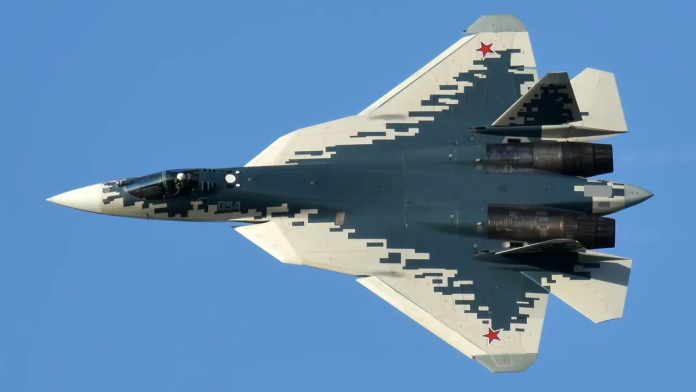Malaysia’s bold move to upgrade its air force with advanced Russian fighter jets may now be in serious trouble. A high-profile plan to buy the stealthy Su-57 Felon aircraft from Russia is facing strong headwinds due to the risk of US sanctions. The deal, once seen as a major step in boosting Malaysia’s air defence, could now be delayed—or even cancelled—if Washington decides to act.
Risky Business: Buying Russian Jets in a US-Dominated World
The Su-57, Russia’s most advanced fifth-generation stealth fighter, was believed to be the top choice for Malaysia’s next-generation multirole combat aircraft (MRCA) programme. The Royal Malaysian Air Force (RMAF) reportedly planned to bring in a first batch of four Su-57E jets as early as 2026, under the 14th Malaysia Plan. A full squadron was expected by 2030.
But the excitement surrounding the deal has now turned into uncertainty.
At the centre of the issue is a US law known as CAATSA—the Countering America’s Adversaries Through Sanctions Act. This law allows the United States to impose penalties on countries that make big defence purchases from Russia, Iran, or North Korea. The law has already affected countries like India, Turkey, and Indonesia. Now, Malaysia might be next.
Malaysia agrees to spend $150 billion on U.S. tech and energy under new trade deal
Earlier this year, two Su-57 jets were supposed to appear at Malaysia’s top defence show, LIMA25. One was expected to be on display and the other to perform daily flight demonstrations. But both were mysteriously absent, and no official reason was given. This missing showcase has only added fuel to rumours that the Su-57 deal may not go ahead.
US Pressure and Economic Stakes
What makes the situation more delicate is Malaysia’s recent warming of ties with the United States. A major trade deal saw US tariffs on Malaysian goods drop from 25% to 19%. But the agreement came at a high cost—over US$240 billion in investments and purchases.
These included:
- US$150 billion in semiconductor, aerospace, and data centre investments in Malaysia
- US$70 billion in Malaysian investments in the US
- US$19 billion in Boeing aircraft orders by Malaysia Aviation Group
- US$3.4 billion annually in LNG purchases by Petronas
- Over US$100 million yearly in telecom and coal purchases
With such large deals on the table, Malaysia may not want to upset its relationship with Washington by going forward with a Russian defence purchase. The stakes are even higher with the US President expected to visit Kuala Lumpur in October for the ASEAN Summit.
Russia slams US ‘neocolonial’ tariffs: Is America sabotaging global trade?
Under CAATSA, even a single major military deal with Russia—like buying the Su-57—could lead to sanctions, unless the US president personally approves a waiver. But this approval is not guaranteed.
A Strategic Gamble Behind the Scenes?
Despite the risks, some defence watchers say the US might quietly welcome the deal for its own reasons. Since no country has used the Su-57 in actual combat, it remains a mystery to military analysts. By allowing Malaysia—a long-time US military partner—to operate the jet, the US could get a rare chance to observe the aircraft up close during joint exercises.
Malaysia has previously operated Russian jets like the MiG-29 and Su-30MKM, which gave other countries valuable insights during multinational training events. Exercises such as Cope Taufan, Pitch Black, and DACT have often served as intelligence-gathering opportunities.
Still, this would be a risky move. The potential benefits of technical insights may not outweigh the political fallout. The fear of sanctions and economic loss could now force Malaysia to rethink its strategy—even as its air force prepares for a new chapter.
As of now, the Su-57 deal has not been officially confirmed or cancelled. But with pressure mounting on all sides, the future of the plan remains unclear.


